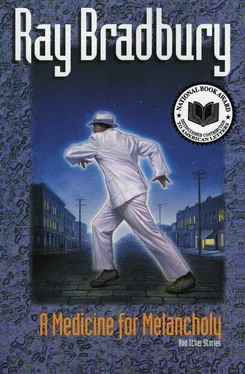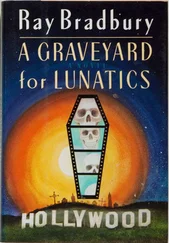A Medicine for Melancholy
And Other Stories
Ray Bradbury
For Dad ,
Whose love, very late in life, surprised his son.
And for Bernard Berenson and Nicky Mariano ,
who gave me a new world.
For Charles Beaumont
who lived in that little house
halfway up in the next block
most of my life.
And for Bill Nolan
and Bill Idelson , friend of Rush Gook ,
and for Paul Condylis …
Because …
In a Season of Calm Weather
George and Alice Smith detrained at Biarritz one summer noon and in an hour had run through their hotel onto the beach into the ocean and back out to bake upon the sand.
To see George Smith sprawled burning there, you’d think him only a tourist flown fresh as iced lettuce to Europe and soon to be transshipped home. But here was a man who loved art more than life itself.
“There …” George Smith sighed. Another ounce of perspiration trickled down his chest. Boil out the Ohio tap water, he thought, then drink down the best Bordeaux. Silt your blood with rich French sediment so you’ll see with native eyes!
Why? Why eat, breathe, drink everything French? So that, given time, he might really begin to understand the genius of one man.
His mouth moved, forming a name.
“George?” His wife loomed over him. “I know what you’ve been thinking. I can read your lips.”
He lay perfectly still, waiting.
“And?”
“Picasso,” she said.
He winced. Someday she would learn to pronounce that name.
“Please,” she said. “Relax. I know you heard the rumor this morning, but you should see your eyes—your tic is back. All right, Picasso’s here, down the coast a few miles away, visiting friends in some small fishing town. But you must forget it or our vacation’s ruined.”
“I wish I’d never heard the rumor,” he said honestly.
“If only,” she said, “you liked other painters.”
Others? Yes, there were others. He could breakfast most congenially on Caravaggio still lifes of autumn pears and midnight plums. For lunch: those fire-squirting, thick-wormed Van Gogh sunflowers, those blooms a blind man might read with one rush of scorched fingers down fiery canvas. But the great feast? The paintings he saved his palate for? There, filling the horizon like Neptune risen, crowned with limeweed, alabaster, coral, paint-brushes clenched like tridents in horn-nailed fists, and with fishtail vast enough to fluke summer showers out over all Gibraltar—who else but the creator of Girl Before a Mirror and Guernica?
“Alice,” he said patiently, “how can I explain? Coming down on the train, I thought, Good lord, it’s all Picasso country!”
But was it really? he wondered. The sky, the land, the people, the flushed pink bricks here, scrolled electric-blue ironwork balconies there, a mandolin ripe as a fruit in some man’s thousand fingerprinting hands, billboard tatters blowing like confetti in night winds—how much was Picasso, how much George Smith staring round the world with wild Picasso eyes? He despaired of answering. That old man had distilled turpentines and linseed oil so thoroughly through George Smith that they shaped his being, all Blue Period at twilight, all Rose Period at dawn.
“I keep thinking,” he said aloud, “if we saved our money …”
“We’ll never have five thousand dollars.”
“I know,” he said quietly. “But it’s nice thinking we might bring it off someday. Wouldn’t it be great to just step up to him, say ‘Pablo, here’s five thousand! Give us the sea, the sand, that sky, or any old thing you want, we’ll be happy …’”
After a moment his wife touched his arm.
“I think you’d better go in the water now,” she said.
“Yes,” he said. “I’d better do just that.”
White fire showered up when he cut the water.
During the afternoon George Smith came out and went into the ocean with the vast spilling motions of now warm, now cool people who at last, with the sun’s decline, their bodies all lobster colors and colors of broiled squab and guinea hen, trudged for their wedding-cake hotels.
The beach lay deserted for endless mile on mile save for two people. One was George Smith, towel over shoulder, out for a last devotional.
Far along the shore another shorter, square-cut man walked alone in the tranquil weather. He was deeper-tanned, his close-shaven head dyed almost mahogany by the sun, and his eyes were clear and bright as water in his face.
So the shore-line stage was set, and in a few minutes the two men would meet. And once again Fate fixed the scales for shocks and surprises, arrivals and departures. And all the while these two solitary strollers did not for a moment think on coincidence, that unswum stream which lingers at man’s elbow with every crowd in every town. Nor did they ponder the fact that if man dares dip into that stream he grabs a wonder in each hand. Like most, they shrugged at such folly and stayed well up the bank lest Fate should shove them in.
The stranger stood alone. Glancing about, he saw his aloneness, saw the waters of the lovely bay, saw the sun sliding down the late colors of the day, and then, half turning, spied a small wooden object on the sand. It was no more than the slender stick from a lime ice cream delicacy long since melted away. Smiling, he picked the stick up. With another glance around to reinsure his solitude, the man stooped again and, holding the stick gently, with light sweeps of his hand began to do the one thing in all the world he knew best how to do.
He began to draw incredible figures along the sand.
He sketched one figure and then moved over and, still looking down, completely focused on his work now, drew a second and a third figure, and after that a fourth and a fifth and a sixth.
George Smith, printing the shore line with his feet, gazed here, gazed there, and then saw the man ahead. George Smith, drawing nearer, saw that the man, deeply tanned, was bending down. Nearer yet, and it was obvious what the man was up to. George Smith chuckled. Of course … Alone on the beach this man—how old? Sixty-five? Seventy?—was scribbling and doodling away. How the sand flew! How the wild portraits flung themselves out there on the shore! How …
George Smith took one more step and stopped, very still.
The stranger was drawing and drawing and did not seem to sense that anyone stood immediately behind him and the world of his drawings in the sand. By now he was so deeply enchanted with his solitudinous creation that depth bombs set off in the bay might not have stopped his flying hand nor turned him round.
George Smith looked down at the sand. And after a long while, looking, he began to tremble.
For there on the flat shore were pictures of Grecian lions and Mediterranean goats and maidens with flesh of sand like powdered gold and satyrs piping on hand-carved horns and children dancing, strewing flowers along and along the beach with lambs gamboling after, and musicians skipping to their harps and lyres and unicorns racing youths toward distant meadows, woodlands, ruined temples, and volcanoes. Along the shore in a never-broken line, the hand, the wooden stylus of this man, bent down in fever and raining perspiration, scribbled, ribboned, looped around over and up, across, in, out, stitched, whispered, stayed, then hurried on as if this traveling bacchanal must flourish to its end before the sun was put out by the sea. Twenty, thirty yards or more the nymphs and dryads and summer founts sprang up in unraveled hieroglyphs. And the sand in the dying light was the color of molten copper on which was now slashed a message that any man in any time might read and savor down the years. Everything whirled and poised in its own wind and gravity. Now wine was being crushed from under the grape-blooded feet of dancing vintners’ daughters, now steaming seas gave birth to coin-sheathed monsters while flowered kites strewed scent on blowing clouds … now … now … now …
Читать дальше












